Are you ready for Walkout Wednesday? Everything you need to know about London’s big day of strikes

If you were planning to take the kids to cheer on the junior doctors today, you might want to pack a raincoat and dust off the bikes. In case the school and doctor strikes weren’t enough to be getting your head around this week, Wednesday will also see the entire Tube network grind to a halt. Oh, and university staff and civil servants will be back on picket lines around the capital to add to the chaos, too. We would call it Walkout Wednesday, but we’ve had one of those already just last month — and it’s unlikely to be the last.
What’s notable about this particular Walkout Wednesday is that it coincides with Budget Day. So far, the Government has stuck to its line that the current economic crisis means it doesn’t have the money to meet public sector workers’ demands, but union leaders are standing firm, deliberately coordinating their plans for industrial action to cause maximum disruption on the day chancellor Jeremy Hunt unveils his economic plan. Proposed legislation designed to restrict their right to strike is only adding fuel to the mass frustration.
You’ll do well to miss the madness if you’re out and about Wednesday: unions including the National Education Union are planning a “carnival”-style march from Hyde Park to Trafalgar Square from noon, and more than 133,000 civil servants from 124 government departments are set to walkout alongside teachers, doctors, Tube and university workers. Even local BBC staff are joining in — not over the Gary Lineker row (though many of them are furious about that, too), but over plans to merge some local radio shows.
From the industries walking out this month to why they’re doing it, here’s your cheatsheet to Walkout Wednesday 2.0.
Junior doctors
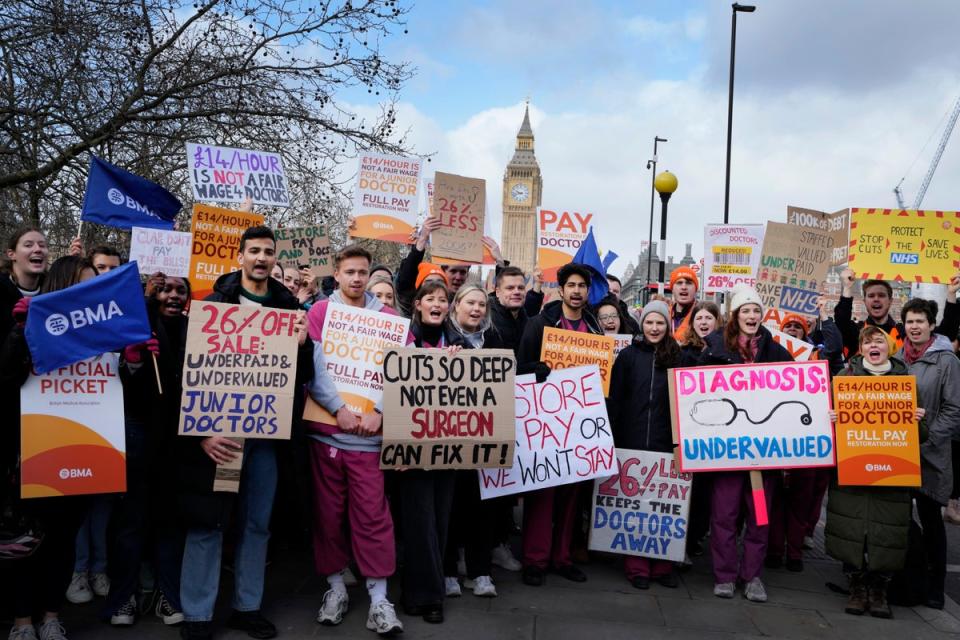
It’s official: junior doctors can now make more serving coffee in Pret than saving patients’ lives. This is the shocking statistic that’s been doing the rounds on social media in recent days, as junior medics begin their first-ever walkout and what could be the worst strike in NHS history. Officials from NHS England expect it to have a bigger impact than any of the previous strikes by nurses, physiotherapists and ambulance staff.
Junior doctors make up around 40 per cent of the NHS’ medical workforce and two thirds of of them — more than more than 47,600 medics — are members of the British Medical Association (BMA) union and therefore expected to walkout of both routine and emergency care departments over the three-day strike, including those on nights, on-call shifts and non-resident work. More than 200,000 operations and appointments are expected to be cancelled.
The 72 consecutive hours of action started yesterday and runs through to 7am on Thursday morning, with officials warning that it will take several weeks — if not months — for the service to recover, with a huge impact on the drive to reduce waiting lists for elective care.
The reason for the strikes: Pay. The 48,000 striking doctors are “demoralised, angry and no longer willing to work for wages that have seen a real-terms decline of over 26 per cent in the past 15 years”, according to the BMA.
The face of the strikes: Dr Naru Narayanan, president of the Hospitals Consultants and Specialists Association, who says enough is enough: “Junior doctors have held together patient care amid a spiralling staffing crisis. In return for this huge emotional, mental and physical toll, they’ve been subjected to a decade of real-terms pay cuts totalling over 26 percent.”
When they’re due to take place: Until March 16.
Teachers
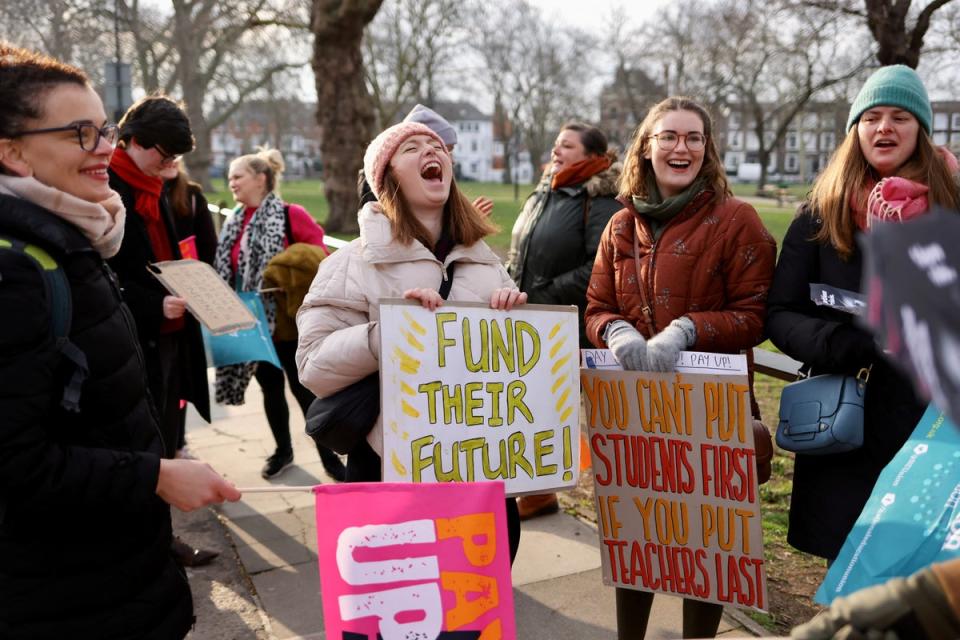
Children accompanying their parents on picket lines have become a familiar sight in recent weeks, as schools are forced to close their doors amid the ongoing teacher strikes.
The latest walkouts are set to take place on Wednesday and Thursday this week and some parents will not know until the morning whether their children will be able to attend school, as union members are not required to inform their employers if they plan to strike. Schools will have to decide how to handle each strike day on an individual basis, and will contact parents and guardians with arrangements in advance.
“More than half of all schools” are expected to close or be partially closed over the two strike days this week, and this is unlikely to be the end of the disruption. The biggest teaching union, the National Education Union (NEU), has refused to rule out striking during the GCSE and A-level exam period this summer.
The reason for the strikes: Pay. Teachers represented by the NEU and other unions have rejected a government offer of an extra 1.5 per cent pay rise, plus 1.5 per cent as a one-off payment, saying they want a pay rise above inflation.
The face of the strikes: Kevin Courtney and Mary Bousted, the joint general secretaries of the NEU. “Teachers have lost 23 percent in real terms since 2010, and support staff 27 percent over the same period,” they argue. “The average 5 percent pay rise for teachers this year is some seven percent behind inflation. In the midst of a cost of living crisis, that is an unsustainable situation.”
When they’re due to take place: March 15 and 16.
Tube staff
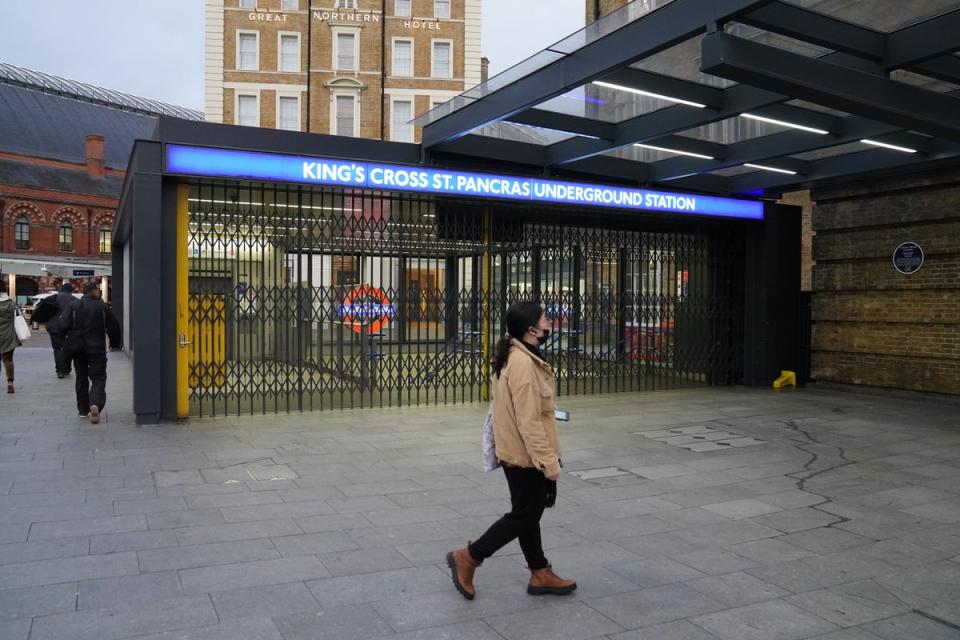
“Little or no Tube services are expected to run”. This is TfL’s forecast for the latest in a series of 24-hour strike actions by thousands of RMT station staff and the first network-wide walkout by 2,000 members from Tube drivers’ union Aslef since 2015.
The walkouts are expected to bring the Underground to a standstill all day, with knock-on effects on Thursday morning, though the Elizabeth Line and London Overground will operate as normal. According to Aslef, 99 per cent of drivers voted in favour of walking out, saying management had failed to “accept that changes to our working arrangements and pensions should only happen by agreement”.
The reason for the strikes: Not pay, but working conditions and pensions. TfL members currently contribute up to five per cent of their salary to their pension, while TfL contributes 6.66 times this amount, a sum equal to 33 per cent of their pay packet. This pensions scheme currently costs TfL about £375m a year and an independent review commissioned by mayor Sadiq Khan in 2020 described it as “expensive and unreformed” and “generous” when compared to the Network Rail and civil service schemes. Reforming it could reportedly save £100m a year by 2025, but unions say there is “no justification” for changing its terms and that this would result in it becoming “significantly less generous” than other public sector schemes. A delayed announcement for the potential changes to the scheme is due on Friday.
The face of the strikes: Finn Brennan, Aslef’s organiser on the Underground, who says the strike isn’t about pay or staff having more time off. “It is about making sure that change and ‘modernisation’ comes about by agreement. Central government has used the effects of the pandemic to insist that TfL targets staff pensions and working conditions. They have no problem bailing out the banks or handing our billions of pounds in dubious contracts to their chums but they refuse to properly fund vital services like public transport in this country.” RMT boss Mick Lynch agrees, saying “Tube workers provide an essential service tothe capital” and therefore reserve “decent pensions, job security and good working conditions” in return.
When they’re due to take place: March 15-19.
Civil servants
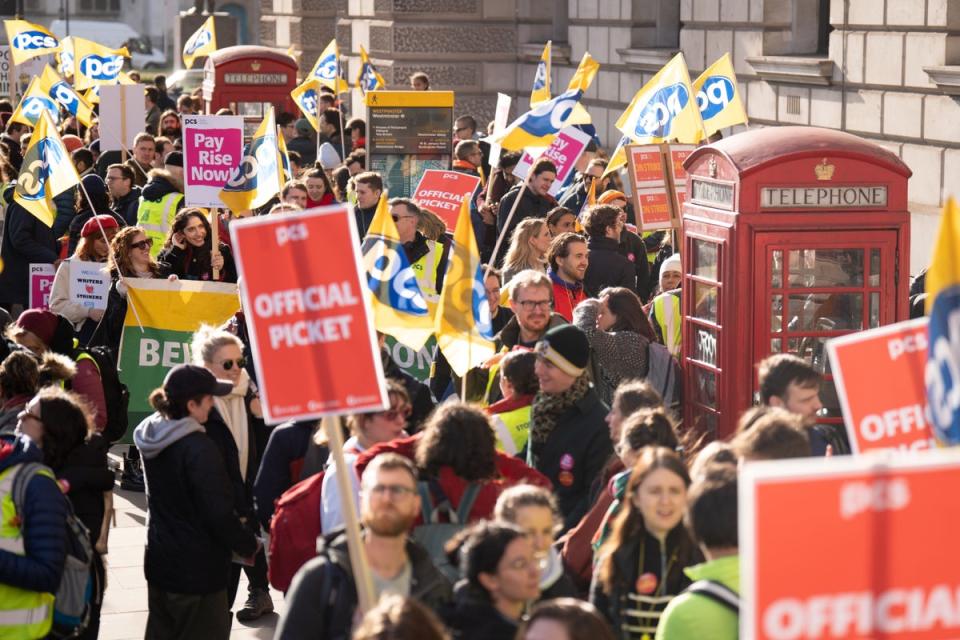
Hunt’s pals in the Treasury might not be walking out on the day of his Spring Budget, but many of his wider civil service colleagues plan to. Some 133,000 staff 124 government departments are set to strike, including driving instructors, Border Force officials and those working for the tax office, job centres, Department for Transport and Department for Work and Pensions, in roles such as Universal Credit handling. HM Revenue and Customs workers will also join the one-day walkout for the first time (there was an earlier strike on February 1, forcing the army to be called in to replace striking border force officers).
Representing all of these civil servants is the Public and Commercial Services (PCS) union, which says it wants to exert “significant” pressure on the government and is calling for a 10 per cent pay rise. Its members currently earn an average of just £23,000 a year.
The reason for the strikes: Pay, pensions, job security and redundancy terms. Civil servants might have recieved rather less attention than their public sector colleagues in recent months, but they’re actually close to the bottom of the pecking order when it comes to pay rises. This year, civil servants received lower average pay increases compared to most other public sector workers, recieving just 2-3 per cent this year, compared to 5.4 per cent for teachers, 4.75 per cent for nurses and 4 per cent for ambulance workers.
The face of the strikes: Mark Serwotka, general secretary of the Public and Commercial Services (PCS) union, who is warning that strikes will “continue to escalate” if ministers don’t put more money on the table. “We’ve been given a two per cent pay rise when food inflation was 16 per cent last week,” he says. “40 thousand civil servants use food banks and 45 thousand claim in work benefits because they’re so poor. To stop the strikes the government must do what we’ve asked them to do what we’ve asked them to do for months and that’s put money on the table and do that now.”
When they’re due to take place: March 15.
University staff
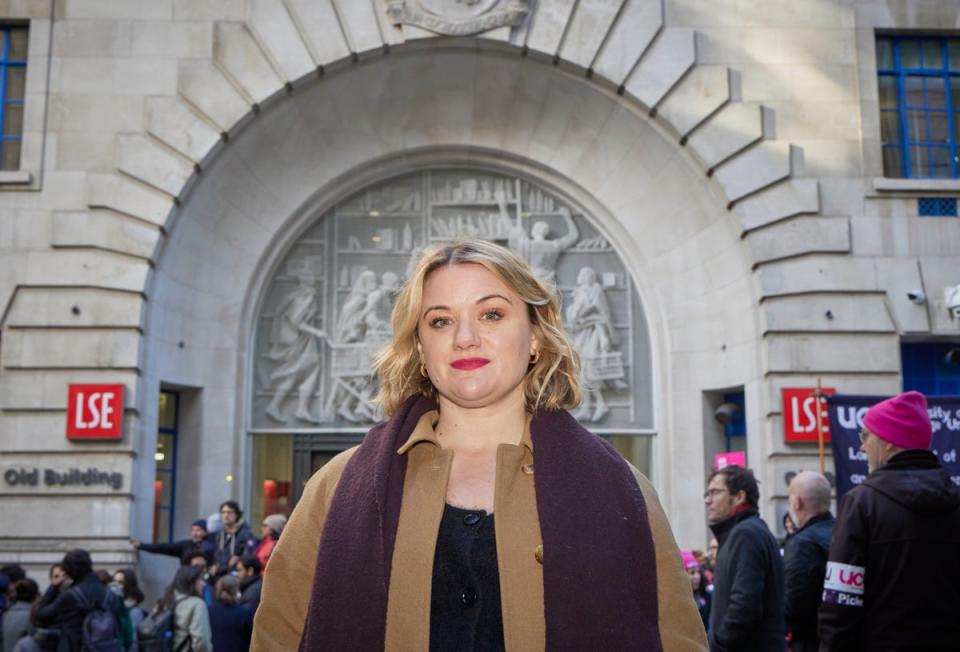
Eighteen. That’s how many days of strikes members of the University and College Union (UCU) had originally planned to strike for over February and March in an ongoing dispute about pay, pensions and working conditions.
In the end, seven of these strike days were called off on February 17 to encourage positive discussion after “significant progress” was made in talks with employers — but from Wednesday, the remaining six days of UCU walkouts will go ahead, with more than 70,000 UCU members from 83 different universities due to be taking part, from lecturers to librarians.
Union chiefs say they know their walkouts are disruptive for poor Covid-hit students, but they have the backing of the National Union of Students and say staff can’t afford not to strike for the sake of future generations. Professors say they they’re having to become amateur mental health workers as well as trying to teach students and that they’ve had to accept that they won’t be able to do their jobs fully. Insecure contracts and mounting workloads mean they’re having to use their free time to do research and answer emails from students and its taking a toll on family life as a result. According to the UCU, half of all university staff are displaying signs of depression.
“Once you figure out how much you get paid for marking and assessment as a teacher, it’s probably £3 an hour,” UCU chief Jo Grady told the Evening Standard last month.
The reason for the strikes: Pay, pensions and working conditions — though not all UCU members are striking over all three. Those at 83 universities say they’re striking over pay and working conditions; those at five universities are striking over pensions; and those at 62 universities are striking over both isues.
The face of the strikes: Grady, who says the “dirty secret” of higher education is that “it’s run on exploiting people”. “We’ve got 100,000 people currently on insecure contracts and this is a sector with £40 billion in reserves,” she says. “Just three per cent of that £40 billion would settle our pay claim, so this is an easily resolvable dispute and we need employers to move.”
When they’re due to take place: March 15-17, 20-22.
BBC local staff
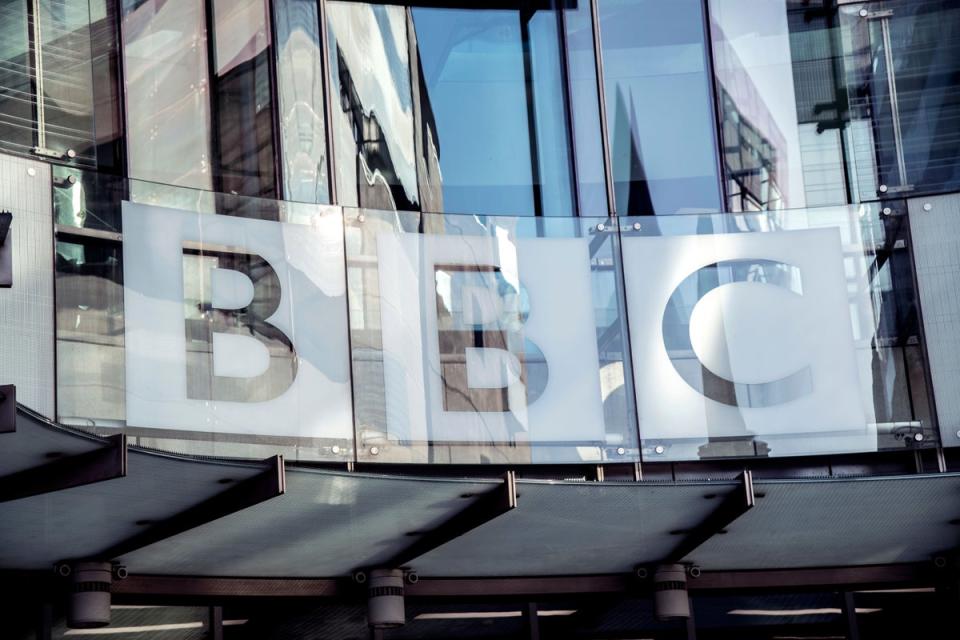
If you’re a BBC radio listener, don’t be surprised if Wednesday’s coverage is a little more sparse than usual. Joining the walkouts are staff working for the BBC’s regional services in England, who are set to stage a 24-hour strike over plans to merge some local radio shows.
According to the National Union of Journalists (NUJ), the stoppage will start at 11am — just 90 minutes before the chancellor’s Budget announcement — and last through to the same time on Thursday. Some 83 per cent of NUJ members voted in favour of the strike and further walkouts are reportedly being considered during May’s local elections, King Charles’ coronation and the Eurovision song contest.
The reason for the strikes: Plans for some local radio shows to share programming, which would result in the loss of 48 staff postings. The BBC says its proposals — for 39 of its local stations to share more shows in the afternoons, evenings and at weekends — will “modernise” local radio services by boosting their online content, but journalists themselves say the future of local radio is at stake.
The face of the strikes: NUJ national broadcasting organiser Paul Siegert, who believes that local content is what local radio is all about. “NUJ members are not opposed to the BBC investing in digital services, but it should not come at the expense of local radio and the communities it serves,” he says. “We urge the BBC to get back around the table and start talking to us to try and find a way forward. No-one wants to take strike action but the future of local radio is at stake and so our members are left with no option.”
When they’re due to take place: March 15 and 16.
Railway workers
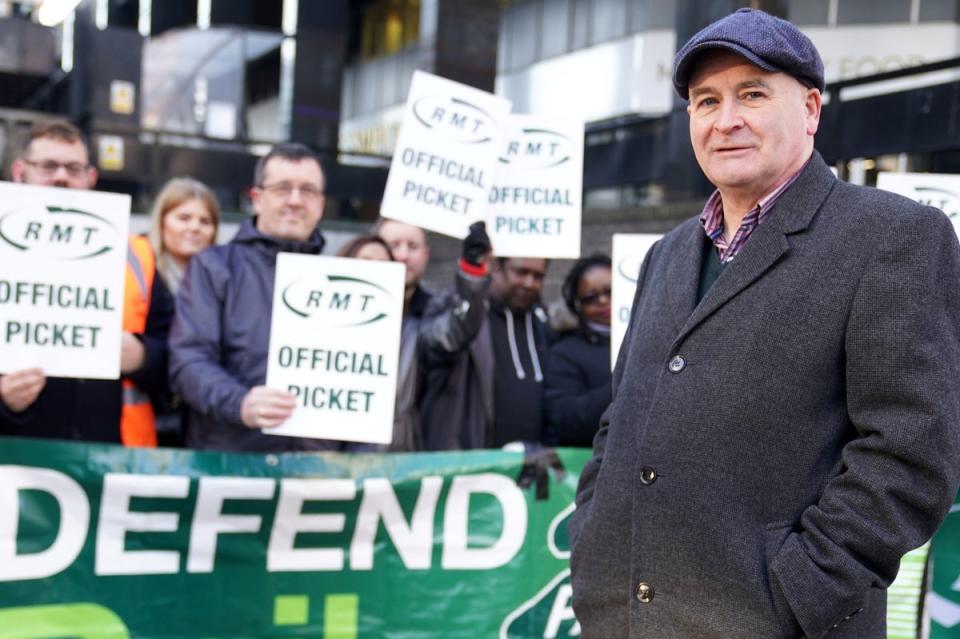
There might not be a train strike Wednesday, but if you were planning to commute in for Thursday drinks or hoping for a weekend getaway, think again — or at least keep a beady eye on Trainline. Almost as soon as the Tube strike comes to an end, the next four days of train strikes begin above ground, the first two planned for Thursday and Saturday.
The most disruptive strike action has, thankfully, been called off by Network Rail, but there’ll be plenty of remaining disruption from RMT and Aslef members. Parts of the Elizabeth line and London Overground, and sections of the District and Bakerloo lines are likely to be disrupted, as will Thameslink, Great Northern and Southern services.
Even after these next four 24-hour walkouts, that’s unlikely to be the end of it. RMT boss Mick Lynch says 94 per cent of his union’s members voted to continue the industrial action and that there’ll be at least six more months of strikes to come.
The reason for the strikes: Pay and working conditions. The current dispute over pay and working conditions has already been going on for over a year and Lynch says he’ll fight for as long as it takes. Last month, Aslef members rejected a pay rise that would amount to around four percent a year for two years.
The face of the strikes: RMT boss Mick Lynch, who says the government can settle this dispute easily by “unshackling” the rail companies. “However, its stubborn refusal to do so will now mean more strike action across the railway network and a very disruptive overtime ban.”
When they’re due to take place: March 16, 18, 30 and April 1.

 Yahoo News
Yahoo News 